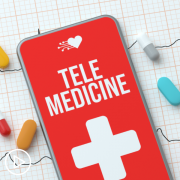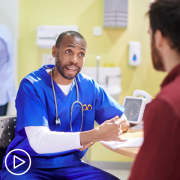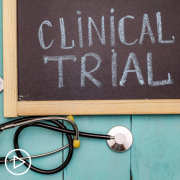Acute Myeloid Leukemia, Recommended Coping Methods and Mental Health
Acute Myeloid Leukemia, Recommended Coping Methods and Mental Health from Patient Empowerment Network on Vimeo.
How can acute myeloid leukemia (AML) patients and care partners find coping methods? Watch as expert Dr. Catherine Lai shares advice and resources to help with mental health and ways to cope with AML over the long term.
See More from Best AML Care No Matter Where You Live
Related Resources:

What Role Does Telemedicine Play in Acute Myeloid Leukemia Care? |

|

Advice for Acute Myeloid Leukemia Patients Seeking a Clinical Trial |
Transcript:
Sasha Tanori:
Right. So a silent side effect that people facing cancer don’t always talk about is mental health. Are there any treatments or coping methods that you recommend for patients and care partners?
Dr. Catherine Lai:
Yeah, so I would say to get social work involved early on, I think there’s also…it’s silent, because there’s a lot of stigma around it, is that is something that we should be talking about or not talking about or…I can handle it, that sort of thing, so I introduce our social worker very early to know that she is a resource for the patients, no matter how big or how small, just to try to get them used to that idea. What I would also say is just talking with as many people as possible as I’m sure you realize that the network and the community is small, and everybody is willing to help each other out. So once you put yourself out there, you’ll realize that there are other resources out there, and you’re not alone in this journey, and what your cancer team offers you is different than what other patients who have gone through exactly what you’ve gone through can offer, and so I know that there are other resources out there in terms of societies that connect other patients who have the same diagnosis. So I would say it’s really just about education and talking and knowing that it’s okay to talk about your diagnosis and no matter what format that is, or if it’s a little bit now and a little bit later, and also just normalizing it, in the sense of the feelings you have are valid and normal. And if you don’t have those feelings is actually when I get worried about patients because you’re supposed to have certain reactions, you were a young patient and you were diagnosed with cancer.
That’s not a trivial thing. And we’re just…we’re all here to help you and help the patients go through everything.



